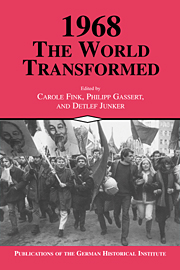Book contents
- Frontmatter
- Introduction
- Part One Tet and Prague: The Bipolar System in Crisis
- Part Two From Chicago to Beijing: Challenges to the Domestic Order
- Part Three “Ask the Impossible!”: Protest Movements of 1968
- 12 The Revolt Against the Establishment
- 13 The Changing Nature of the European Working Class
- 14 The Women's Movement in East and West Germany
- 15 1968: A Turning Point in American Race Relations?
- 16 The Revival of Holocaust Awareness in West Germany, Israel, and the United States
- 17 The Nuclear Threat Ignored
- Epilogue
- Index
14 - The Women's Movement in East and West Germany
Published online by Cambridge University Press: 05 January 2013
- Frontmatter
- Introduction
- Part One Tet and Prague: The Bipolar System in Crisis
- Part Two From Chicago to Beijing: Challenges to the Domestic Order
- Part Three “Ask the Impossible!”: Protest Movements of 1968
- 12 The Revolt Against the Establishment
- 13 The Changing Nature of the European Working Class
- 14 The Women's Movement in East and West Germany
- 15 1968: A Turning Point in American Race Relations?
- 16 The Revival of Holocaust Awareness in West Germany, Israel, and the United States
- 17 The Nuclear Threat Ignored
- Epilogue
- Index
Summary
Parallel to international developments, both postwar German states underwent a process of modernization and adjustment from the mid-1960s to the late 1980s. The reform of societal and political structures failed in the former German Democratic Republic (GDR), and the East German state left the international political stage with reunification in 1990. In contrast, the modernization of the Federal Republic of Germany (FRG) was accomplished within the context of a parliamentary system and was symbolized by the “transfer of power” from a conservative government to a social-liberal coalition in the fall of 1969. This change can be attributed in no small measure to the evolution of extraparliamentary opposition and the student movement of 1968.
Nineteen sixty-eight, the high point of the student movement, also witnessed the birth of the West German women's movement. At the same time, the GDR supported the military intervention in Czechoslovakia in 1968 and suppressed any domestic attempt to allow diversity of opinion or elements of democratic socialism. These developments meant that East German women had no political latitude for independently expressing their concerns in the form of an autonomous women's movement. Only art and literature, as substitutes for public discussion, were available as means to articulate experiences with sex discrimination in everyday life and to establish a modern woman's consciousness.
- Type
- Chapter
- Information
- 1968: The World Transformed , pp. 373 - 396Publisher: Cambridge University PressPrint publication year: 1998
- 1
- Cited by

